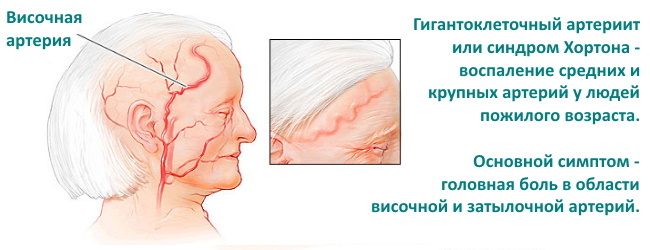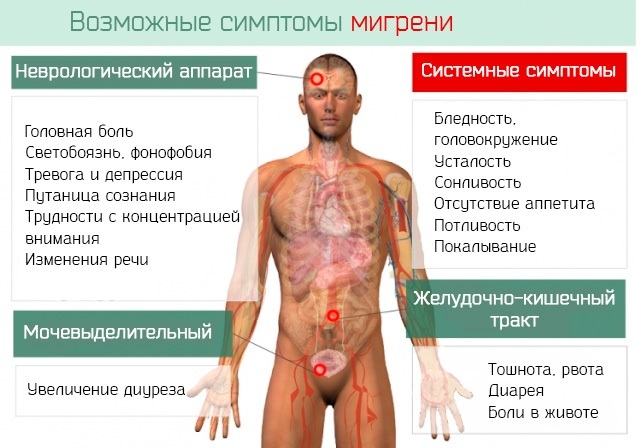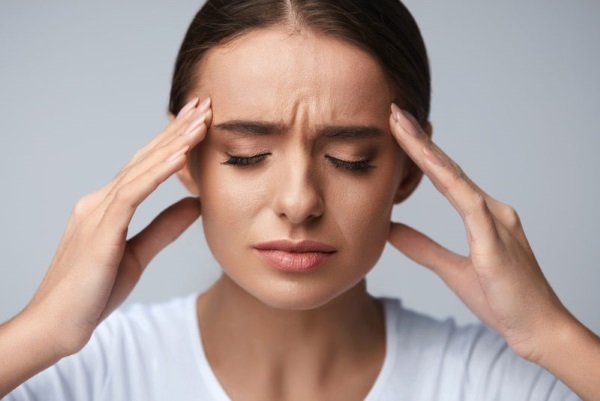Content
- Possible reasons
- Pathological causes of pulsation in the temples
- Symptoms
- Diagnostics
- Treatment methods
- First aid
- Drug therapy
- Folk remedies
- Possible consequences and complications
- Video about headache in the temples
State when presses and knocks at the temples, may bother a person rarely or constantly. The reason is numerous provoking factors, which can be determined by a physician therapist or neurologist. The specialist will conduct an examination, prescribe a diagnosis and select an individual treatment regimen, taking into account the results obtained.
Possible reasons
Pressure and discomfort in the temples can result from various irritating factors. These are external or internal reasons. A physician therapist will help to establish an accurate diagnosis.
Physiological causes of pulsation in the temples:
- alcohol abuse;
- severe hypothermia of the body;
- a sharp refusal from caffeinated drinks;
- severe stress shock;
- sleeping in an uncomfortable position;
- prolonged stay on a flat surface;
- abuse of a coffee drink;
- severe overwork;
- great physical activity;
- passive lifestyle;
- lack of even minimal physical activity;
- unhealthy diet, abuse of harmful products (chocolate products, preservatives, spices);
- severe intoxication of the body (poisoning with alcoholic beverages, medicines, poisonous substances or carbon monoxide);
- strict diet or fasting.
Physiological causes are not associated with disease. Therefore, after eliminating the provoking factor, the pain syndrome and pressure in the temple area pass on their own. In women, pressure and knocking in the temples occurs at the onset of menopause or during a certain period of the menstrual cycle. A pathological condition also occurs if a person is in a stuffy room for a long time.
Pathological causes of pulsation in the temples
Pressure and knocking in the temples provoke degenerative changes in the musculoskeletal system. The same applies to the cardiovascular system, neoplasms in the brain area.
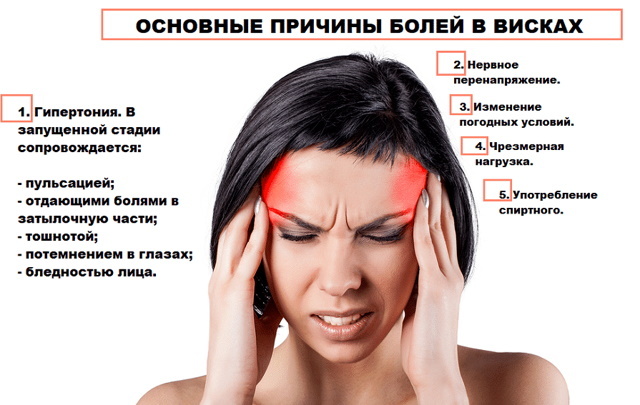
All possible pathological causes are classified into specific groups:
| Name | Description |
| Vascular lesion |
|
| Neurological diseases |
|
| Orthopedic diseases |
|
| Other pathological causes |
|
In any situation, against the background of a provoking factor, a person has concomitant clinical symptoms with which one cannot stay at home. Timely diagnosis will help identify the disease and choose the most effective treatment.
Symptoms
Presses, knocks at the temples (the doctor and diagnosis will help determine the causes of discomfort) in a person against a background of various pathologies. In the case of a serious illness, the patient develops concomitant symptoms:
| Name | Symptoms |
| Migraine |
|
| Cluster headache |
|
| Injury, head trauma |
|
| Temporal arteritis |
|
| Infectious diseases |
|
| Pheochromocytoma of the adrenal gland |
|
| Arterial hypertension |
|
| Intracranial hypertension |
|
Regardless of the cause of the pathological condition, a person who crushes and knocks in the temples needs medical attention. Otherwise, progressive degenerative changes in the body will lead to serious complications.
Diagnostics
A comprehensive examination with severe pressing pain in the temple area is necessary for a person to determine the main cause of the pathological condition. It is important to identify the disease at an early stage of development, choose a treatment and stop its progression.
Presses, knocks at the temples (the causes of discomfort may be in the development of a serious disease), in order to determine the source of problems, the patient is assigned the following diagnostic measures:
| Name | Description |
| General and biochemical blood test | Studies are carried out to determine the development of the inflammatory process in the human body or to assess the functioning of internal organs at the molecular level. The level of platelets, leukocytes, erythrocytes changes. The same goes for the erythrocyte sedimentation rate. |
| Coagulogram | Specialists check the blood for clotting. |
| Lumbar puncture | During the examination, cerebrospinal fluid is collected. The sampling of the test material is carried out in the lumbar region. |
| X-ray | The paranasal sinuses are examined to look for a tumor, cyst, or fluid accumulation. Such pathological changes are often accompanied by inflammatory and infectious diseases. |
| Computed tomography (CT) | The most informative examination method, which is prescribed to study tissues and blood vessels in the region of the brain. |
| Magnetic resonance imaging (MRI) | A modern diagnostic method that allows for a short period of time to determine various changes in the structures of the brain. |
| Electroencephalogram | The electrical capacity of the brain tissue is assessed. |
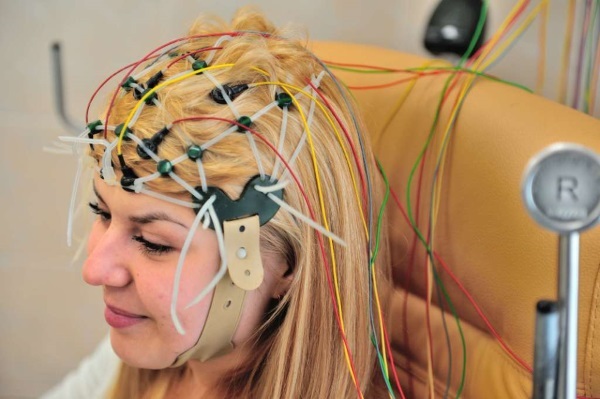
Presses, knocks at the temples (medical diagnostics and a doctor will help determine the causes of pathology), which means that it is additionally necessary to monitor blood pressure. The therapist recommends taking measurements in the morning and in the evening, while recording the obtained parameters for the analysis of developing pathological processes.
It is important to differentiate the disease, since many pathologies are accompanied by similar clinical symptoms. Taking into account the diagnosis, the therapist may additionally prescribe the patient a consultation with a specialized doctor (psychiatrist, neurosurgeon, cardiologist or ophthalmologist).
Treatment methods
Comprehensive diagnostics and drug therapy is necessary for a person if he presses and knocks on his temples for 2 days. At the same time, concomitant symptoms appeared, which intensify against the background of physical exertion. The treatment regimen is individually selected for each patient, depending on the established diagnosis.
First aid
Pressure and knocking in the temples can appear abruptly, it all depends on the provoking factor. A person needs a doctor's consultation and therapy.
But the following actions will help to remove the attack in the first minutes of the pathological condition:
- A person needs to create the most comfortable conditions. Exclude bright light, loud sounds, put the patient to bed.
- Put a cold compress on your head. Even a wet towel is enough.
- If there are no other severe symptoms, a massage of the temples, neck and shoulders can be done.
- Prepare a warm tea for a person with the addition of a small lemon wedge.
- In case of severe pain, you can give a person 1-2 tablets of an anesthetic drug (Paracetamol, Ibuprofen)
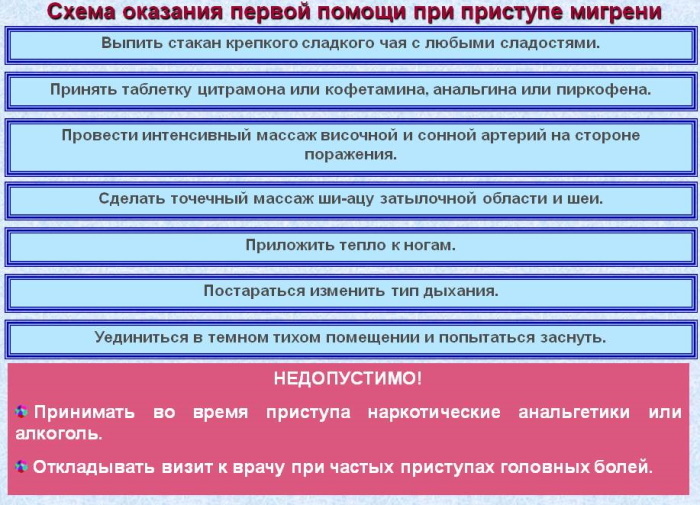
The first aid is also acupressure, which involves the impact on biologically active points. In women, this site is located on the membrane between the thumb and forefinger on the right hand. The specified area must be squeezed with the index and thumb of the left hand, then massage for 2 minutes. For men, the area of influence is, on the contrary, on the left hand. Frequent recurrences of seizures require hospitalization. Do not delay the examination, as pain and pressure may be the result of a serious illness.
Drug therapy
Presses and knocks on the temples of a person often against the background of a serious illness. In this situation, the patient is assigned a comprehensive diagnosis, based on the results of which a treatment regimen is selected. The doctor prescribes medications taking into account the individual characteristics of the human body and the symptoms present.
| Drug group | Name | Application |
| Analgesics | Paracetamol, Acetylsalicylic acid | Medicines reduce pain and have a mild anti-inflammatory effect. The tablets should be taken orally with plenty of water. The adult dosage is 500 mg 4 times a day, preferably after a meal, 1-2 hours later. The course of treatment lasts 3-5 days.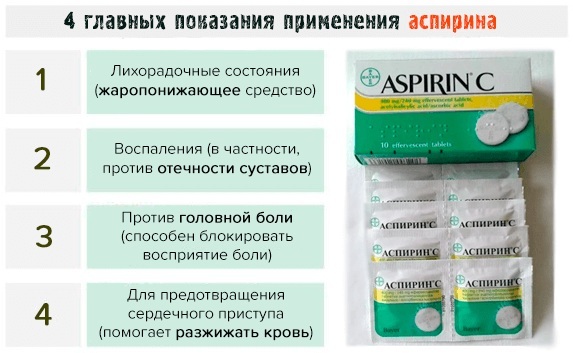
|
| Abortive medicines | Sumatriptan, Morphine | The drugs are prescribed for patients with bouts of severe pain, which analgesics do not help to reduce. The tablets are swallowed whole and washed down with a sufficient amount of water. The adult dosage depends on the condition of the person and is 50-100 mg per day. |
| Antidepressants | Nortriptyline, Amitriptyline | Medicines reduce symptoms of depression. The average dosage for an adult patient is 75-100 mg per day (1 tablet 3-4 times a day). |
| Beta-blockers | Verapamil, Nifedipine | The drugs lower blood pressure. The medicine is recommended to be taken orally and washed down with water, the standard dosage is 40-80 mg 3 times a day. |
| Antiepileptic drugs | Gabapentin, Topiramate | The standard treatment regimen provides for an adult dosage of 300 mg 3 times a day. |
| Antihistamines | Cyproheptadine, Diphenhydramine | The tablets are taken orally after meals, washed down with a little water. Adult patients are prescribed 4 mg 3 times a day. |
It is important not only to strictly observe the dosage of drugs, but also to adhere to the doctor's recommendations. Walk more in the fresh air, take vitamins, eat properly and fully, exercise moderately and completely abandon bad habits.
Folk remedies
Alternative medicine is used for mild headaches of a pulsating nature, if there are no pronounced symptoms indicating the development of a serious illness. It is important to discuss the use of any prescriptions with a physician or neurologist, since the constituent components can provoke allergies or individual sensitivity.
Presses, knocks on the temples (causes of discomfort can be of a physiological or pathological nature), The following effective recipes will help reduce discomfort: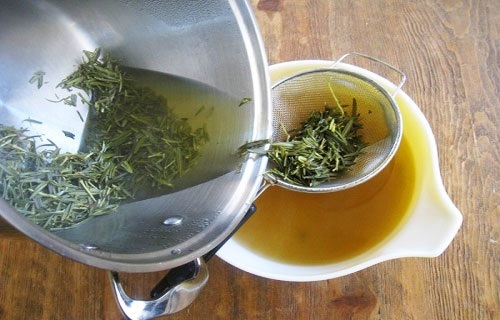
| Name | Recipe | Application |
| Tortillas | Boil 4-5 beans. Chop them and mix with the grated garlic clove. Add 2-3 drops of vegetable oil. Mash all ingredients well and form 2 small cakes. | The resulting masses are recommended to be applied to the temples before going to bed for 30-40 minutes. |
| Valerian | Grind dry valerian root and add 1 tbsp. hot water (1 tbsp.). Put the resulting mass in a water bath and heat for 20 minutes. Insist 1 hour and strain. Add hot water to make 200 ml. | The finished broth should be taken 3 times a day, 1 tbsp. before meals in 30 minutes. |
| Elder | Brew 2 pinches of medicinal herbs with boiling water (1 tbsp.). Insist for 30-40 minutes and drain. | The filtered infusion is recommended to be taken orally, 50 ml 3 times a day. |
Treatment with folk remedies takes time, the drugs will not work right away. It is necessary to continue therapy with any means for at least a week. It is also important to carry out treatment in a complex, along with traditional drugs.
Possible consequences and complications
The throbbing and pressing pain in the temples cannot be ignored. A pathological condition can be the result of a serious illness, therefore, a person needs a comprehensive diagnosis and a properly formulated treatment.
A progressive disease in which presses and knocks in the temples will lead to serious complications:
- myocardial infarction against the background of hypertension;
- hemorrhagic or ischemic stroke as a result of intracranial hypertension;
- herniated discs and protrusion causes cervical osteochondrosis;
- pinching of nerve endings and deterioration of sensitivity occurs against the background of spondylosis.
Narrowing or inflammation of the arteries in an area of the brain will result in poor circulation and damage to the tissues in that area. When he knocks and presses on the temples, a person feels discomfort, his usual way of life is disrupted. Irritability appears, mood worsens, concentration of attention decreases. The end result will be poor performance.
Often crushes and knocks on the temples due to physiological factors, against the background of severe fatigue after a hard day or severe stress. It is enough for a person to rest for his condition to recover. If the symptom is present for a long time, and even medications do not help to calm it down, it is necessary to consult a physician or neurologist. A serious illness may be the cause.
Video about headache in the temples
Causes of headaches in the temples and what to do:

